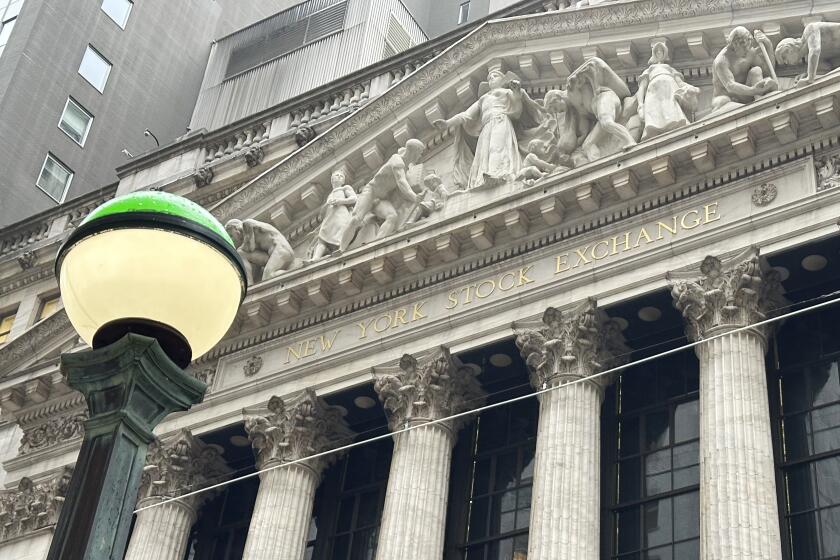E-Broker May Be Last Place to Park Cash
Looking for the best place to stash your short-term cash? Then look beyond your online brokerage firm.
Many people who are getting out of stocks as the market struggles are leaving their idle cash in their e-brokers’ money market funds. Though that’s the easiest move, it may not be the smartest.
The yields paid by e-brokerage money funds often are much lower than those available elsewhere. What’s more, a growing number of firms charge fees to investors with low cash balances who trade infrequently. Those fees can eat up a good chunk of your interest earnings.
Online brokers have little incentive to offer competitive yields, analysts note, because they make money when customers trade stocks--not when they stow cash in money funds for extended periods.
The average taxable money fund nationwide has a seven-day simple yield of 6.01%, according to IMoneyNet Inc., which tracks savings yields.
As the accompanying chart shows, most e-brokerage money fund yields pale in comparison.
In most cases, any money sitting idle in a brokerage account is automatically “swept” into the investor’s choice of money fund.
But some firms don’t sweep cash into money funds. Rather, they pay interest on free cash--but at rates that can be much lower than those of money funds.
For example, Ameritrade currently shells out a paltry 2.75% on idle cash, while National Discount Brokers pays 3.25%.
Those firms, however, don’t impose fees if accounts fall below certain levels, or if customers trade infrequently. At other online brokers that pay higher yields, customers should check when fees kick in. Those charges can be substantial.
For example, E-Trade in October instituted a $15 quarterly fee on customers who have less than $5,000 in their accounts and who have done fewer than two trades in the last six months.
Likewise, TD Waterhouse just implemented a $15 quarterly fee on customers who have less than $5,000 in their accounts and who have traded fewer than four times in the last 12 months.
Certain customers at both firms are exempt from the fees, such as investors in retirement accounts and those who have opened their accounts in the last 12 months.
At Charles Schwab, the biggest online broker, customers with less than $5,000 are charged $25 a quarter, and those with $5,000 to $20,000 are charged $15 a quarter, unless they meet one of the three following criteria: They have more than $50,000 across all household accounts, they agree to deposit $250 monthly to a Schwab account, or they have done at least four stock trades in the last 12 months.
As is often the case in the brokerage business, if your account is large enough you can qualify for higher-yielding money funds at some e-brokers.
At Schwab, for example, customers who can pony up an initial investment of at least $25,000 and maintain a balance of at least $20,000 can qualify for the firm’s Value Advantage taxable money fund, which currently yields 6.32%.
*
Walter Hamilton can be reached at walter.hamilton@latimes.com.
(BEGIN TEXT OF INFOBOX / INFOGRAPHIC)
How Online Brokers’ Cash Accounts Stack Up
Major online brokerages pay low yields on cash balances or charge fees that can make it expensive for low-balance customers to leave money sitting in cash accounts for extended periods. Specifics on some plans:
*--*
Minimum Maximum No. of Current balance to inactivity trades to Brokerage yield* avoid fees fee avoid fee Ameritrade ** 2.75% None None None Charles 5.96 $20,000 $25/qtr. 4 trades Schwab in 12 mos. Datek ** 4.75 None None None DLJdirect 5.68 None None None E-Trade 5.71 $5,000 $15/qtr. 2 trades in 6 mos. Fidelity 6.23 $2,500 $15/qtr. 2 trades in 12 mos. NDB** 3.25 None None None TD Waterhouse 5.99 $5,000 $15/qtr. 4 trades in 12 mos.
*--*
* Simple 7-day yield on primary taxable money market fund.
** Firm does not offer automatic sweep into money market funds, but rather pays interest on free cash in customer accounts at the listed rate.
Sources: IMoneyNet Inc., brokerages listed






